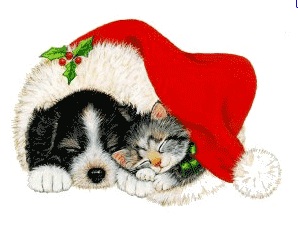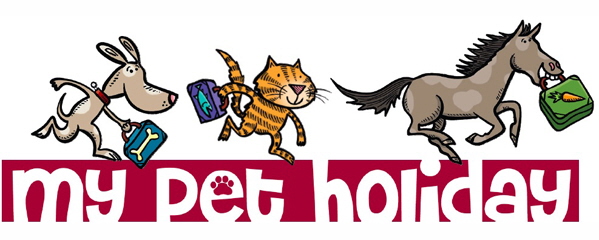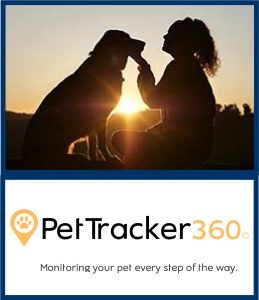With the Holidays Upon Us, It’s Time for Pet Safety Tips
 Many common pet hazards arise during the holiday season: increased traffic in the house, decorations, holiday food, candy and plants. Please keep an eye out for these hazards. Be careful, and watch for:
Many common pet hazards arise during the holiday season: increased traffic in the house, decorations, holiday food, candy and plants. Please keep an eye out for these hazards. Be careful, and watch for:
Food/Candy. All holiday treats are harmful to animals; this includes alcohol, rich fatty foods, scraps, candy, and bones. Just say “no” to any holiday food for your pet. Foods, too richtoo rich, too fatty or too spicy — or anything your pet’s not accustomed to — can trigger a bout of intestinal upset. For some animals, the treat can trigger a serious inflammation of the pancreas or intestine, which can mean a life-threatening illness.
Cooked poultry bones may seem like the perfect gift for the pet who has everything, but do him a favor and save them for the soup. Even the largest cooked turkey bones are prone to splintering, sending shards through the animal’s intestines. Should one pierce through the lining, the result can be deadly peritonitis.
Candy isn’t good for you and it certainly isn’t good for your pets. Aluminum and plastic candy wrappers have great texture, bright colors, and crinkly sounds that intrigue cats and dogs. Pets often will unintentionally consume these items while playing with them. This can lead to stomach upset and/or intestinal blockage. Many dogs possess a fondness for chocolate, which can be deadly. Be on the lookout for yummy-smelling packages under the tree. Your dog will surely sniff out and potentially consume these dangerous gifts. Keep all chocolate in sealed containers or cupboards and off shelves, countertops, and coffee tables.
Decorations. Your beautiful Christmas tree poses many unforeseen dangers to your pet, starting with the water. Pets have a much lower line of sight, and to them a bowl of water is a bowl of water, whether there’s a Christmas tree in it or not. The problem is that pinesap mixed with water, fertilizer, and additives make that Christmas tree water toxic to your pets. Also, stagnant or long-standing tree water can harbor millions of bacteria, which, if ingested by your cat or dog, will cause nausea, vomiting, and/or diarrhea. To solve this problem, be sure to use a water container that doesn’t allow your pets access to take a drink. Such containers are usually available wherever trees are sold.
Christmas tree needles, live or artificial, are toxic, sharp, and indigestible. They can get painfully lodged in the esophagus or intestines. Christmas tree lights can cause electrical burns, choking, or electrocution if pets play with or chew on them. Hide or tape all exposed electrical cords to the walls or floors so pets won’t chew or trip on them. Spray the cords with bitter apple or try over the counter sprays, available from your vet or pet store, that have a bitter taste and will discourage your pets from chewing. Be sure to turn off all Christmas lights when you’re not around.
Having cats or dogs in the household adds a whole new dimension to decorating the tree. Shiny glass ornaments, angel hair, twinkling lights, gold tinsel, and icicles are all irresistible toys for cats and dogs. Everything on the bottom third of your tree is up for grabs. Sharp breakable ornaments, small dreidels, ribbons, bows, ornament hooks, tinsel, and icicles are all very dangerous to pets. Every year, some poor cat or dog actually ingests a broken glass ornament, only to seriously lacerate the inside of their mouth, stomach, and intestines. Even wrapped candy canes can be ingested, causing serious problems. One solution is to decorate the bottom third of your tree with items less likely to cause trouble, such as wooden, metal, or resin-cast ornaments. Hang your treasured baubles high on the tree where they won’t get knocked down and broken or, worse, eaten by your cat or dog. Last but not least, be sure to secure the tree to a wall or ceiling, as cats and dogs are notorious for knocking that well-adorned tree right over. Falling Christmas trees not only hurt pets, but can create a potential fire hazard as well.
Merry Christmas and a Happy New Year!
MARK YOUR CALENDAR !!!
* Annual Pet Celebration Event *
to be held:
Sunday, Jan. 26, 2014 2:00 p.m
Maloof Auditorium
1300 Commerce Drive
Decatur, GA 30030
If you lost a pet during 2013 and wish your pet’s photo to be included
in our annual Pet Celebration event on Jan. 26, please forward the photo to:
pwwcelebration@gmail.com
DEADLINE FOR PET CELEBRATION PHOTOS: DECEMBER 15
Holiday Pet Safety
 Never leave pets unsupervised in the kitchen. Don’t put out bowls of nuts. These seemingly harmless snacks can cause intestinal upset or choking if ingested by your pet. Never give pets breads or baked goods. Yeast and dough are very dangerous. When eaten, the dough will rise and expand in the stomach, causing abdominal pain, bloating, gas, vomiting, disorientation, and depression.
Never leave pets unsupervised in the kitchen. Don’t put out bowls of nuts. These seemingly harmless snacks can cause intestinal upset or choking if ingested by your pet. Never give pets breads or baked goods. Yeast and dough are very dangerous. When eaten, the dough will rise and expand in the stomach, causing abdominal pain, bloating, gas, vomiting, disorientation, and depression.
Plants. Holiday plants may be lovely and festive, but many can cause digestive upset, when nibbled or eaten; some are downright toxic when ingested. Mistletoe is toxic, especially the berries. Holly is moderate to very toxic, especially the berries and leaves. All parts of Ivy and Amaryllis are moderate to very toxic. Christmas Rose, Philodendron, and Dieffenbachia are all moderately toxic. Christmas greens (such as balsam, juniper, cedar, pine, and fir) have a low-level of toxicity. Hibiscus may cause vomiting or bloody diarrhea if ingested. Poinsettia leaves and stems are low in toxicity, but will cause stomach upset if large amounts are eaten.
House Guests. Don’t just expect that your pets, who may not be used to increased traffic in the house, will take this added stress in stride. Take precautions to take the “edge” off your pets by creating a safe haven to which they can retreat. Additionally, pets can get accidentally stepped on or tripped over, so if you plan on having a party or lots of visitors, it is a good idea to set your pet up in a separate, quiet room. This quiet room allows your cat or dog to escape the holiday activities and guests. Be sure to include their food, water, and favorite scratching post or bed. Remember, it only takes one unfocused moment or a turned back for a happy holiday to turn into a horrible one.
Dogs and cats are creatures of habit, so don’t deviate from exercise or feeding schedules. Also, be on the alert when guests arrive. Be sure all visitors know not to let pets escape out the door. It’s also a great time to make sure that all pets have collars with current ID tags and information. Be sure to caution all guests, both kids and adults, not to give your pets anything except their normal food and treats. Non-pet owners are often unaware of the dangers of offering food from their plate to your begging pets.
‘Tis the season, so keep those furry babies safe!
REMEMBER: Each year, in the US, animal shelters are forced to put down 2.7 million adoptable dogs and cats. After the holidays, shelters are flooded with unwanted pets. Live puppies and kittens are not toys or gifts and should not be given as presents (unless agreed upon by all parties). Often, when reality sets in that this “gift” is a living, breathing creature with lots of needs, it is sometimes discarded.

